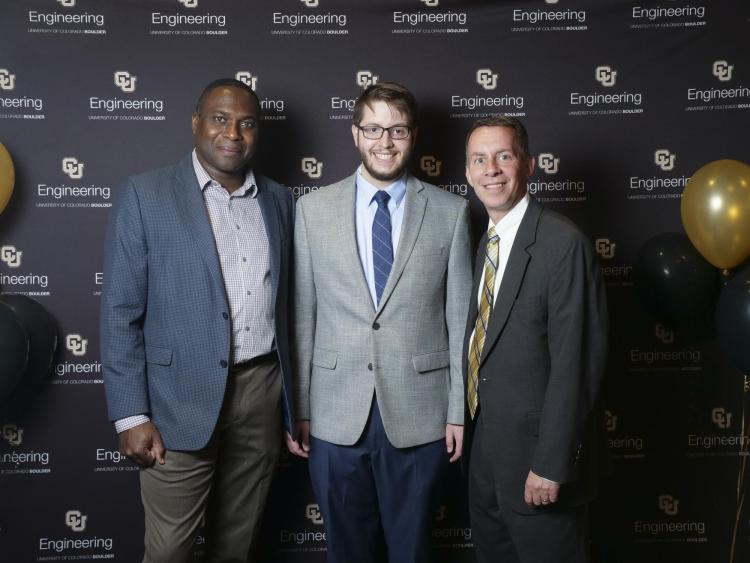William Barham, Applied Math

Applied Math Chair Keith Julien, graduate William Barham and Dean Bobby Braun.
William Barham has served as a learning assistant for nearly every semester since his sophomore year. He has also completed undergraduate research with Applied Mathematics Assistant Professor Ian Grooms, publishing several papers.
Barham is among six individuals named 2019 Outstanding Graduates for Academic Achievement, an award that recognizes graduates with the highest undergraduate GPAs in the College of Engineering and Applied Science.
How did you decide to pursue applied math?
My reasons for studying applied math were initially due to indecision. I loved studying physics, chemistry and biology in high school, and I could not decide which to pursue in college. I reasoned that, as an applied mathematician, I could make contributions to each. I have since also discovered reasons to continue in applied mathematics that are more intrinsic to the process than the product. I have had the opportunity to research oceanographic modeling with Professor Ian Grooms for three years now. Studying a concrete application draws on so many aspects of mathematical knowledge, and numerical simulations can beautifully reproduce phenomena observed in nature.
How have you liked attending CU Boulder? Is there a class or instructor you found really interesting over the years?
My years at CU have been among the happiest and certainly most challenging of my life. I have discovered that I often grossly underestimate my ability to persevere and that my greatest growth comes from those times when I am pushed beyond what I think that I can handle. The pleasure of seeing true progress in my abilities and character is incomparable. The graduate analysis sequence that I took with Applied Mathematics Assistant Professor Stephen Becker and the graduate numerical analysis classes that I took with Grooms pushed me to grow more than any others. I took these sequences at the same time, and I had never before had to devote so much time to homework. The immense difficulty of these courses elevated my understanding of applied mathematics to a much higher level than before.
How does it feel to accept this award? How did you find out?
I was told about this award by my academic advisor Anne Dougherty, the associate department chair for Applied Mathematics. She has been an immense help over the years having pushed me to always seek out as many opportunities as possible. Earlier this semester, she informed me that I was to be nominated for the award and asked me to submit my resume. I was pleasantly surprised to discover that I had received the award. In fact, I had not yet seen the email in my inbox when I was told of the award by several applied mathematics professors. While I have put an immense amount of time into my school work these past few years, it has not been a chore. Studying my class material and becoming involved in the Applied Mathematics Department has been a great joy. It is immensely gratifying to see the fruition of my efforts as I conclude my time here at CU.
What are your future plans after graduation?
Almost immediately after graduation, I will be married to my high school sweetheart, who is finishing a master’s degree in vocal performance this May. This fall, I will begin a PhD in Applied and Computational Mathematics at the Oden Institute for Computational Engineering and Sciences.
What are your career goals when you finish your education?
My area of focus has been fluid dynamics for the past few years. This discipline is an immensely rich area of work for applied mathematicians. The complexity of the dynamics found in fluids is truly astounding. I am particularly interested in studying geophysical and astrophysical fluids (i.e. oceans and atmospheres found on earth and astrophysical bodies). During my time as a BS/MS student at CU, I have mainly studied fluids with neutral charge, but I would also like to study plasmas during my PhD. My ultimate hope is to become a researcher, either as a professor at a university or at a government research lab.

